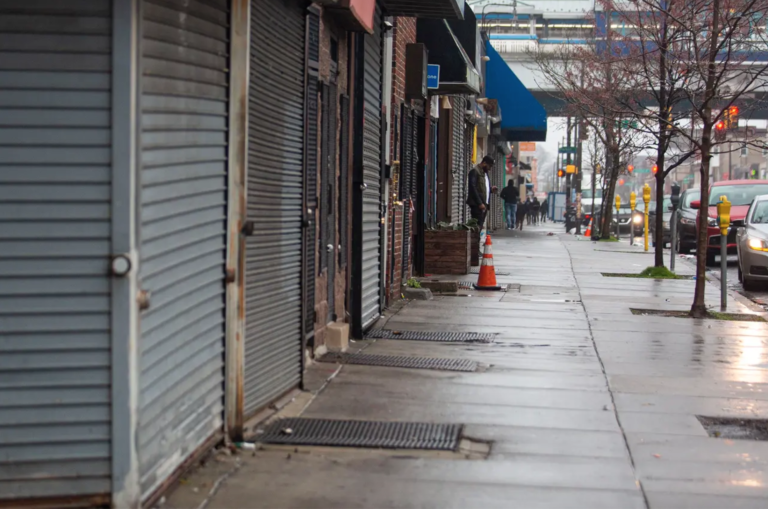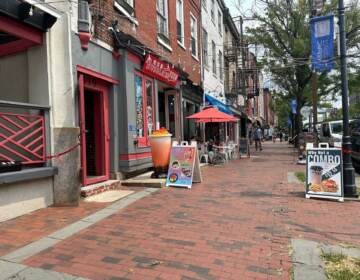Pa. banks inundated with requests for federal small business loans intended to prevent layoffs
A new federal loan program to help small businesses weather the economic fallout of the coronavirus outbreak got off to a shaky start Friday.

(Spotlight PA)
This article originally appeared on Spotlight PA.
–
A new federal loan program to help small businesses weather the economic fallout of the coronavirus outbreak got off to a shaky start Friday, as applications flooded into banks still trying to make sense of rules issued the night before.
The federal Paycheck Protection Program, part of the $2.2 trillion stimulus package signed into law March 27, offers loans guaranteed by the Small Business Administration to help businesses keep workers on their payrolls or rehire those who have been laid off.
The program was rolled out unusually quickly, and major changes were still being made earlier this week. Banks received the program’s rules in writing on Thursday evening, just a few hours before some began accepting applications at midnight on Friday.
“Frankly, right now there are more questions than answers,” said Kevin Shivers, president and CEO of the Pennsylvania Association of Community Bankers. “The rules were written in eight days and they’re still being revised.”
By Friday afternoon, Shivers said, one community bank had received 300 applications. Several banks contacted by Spotlight PA said they were unable to answer questions because they were overwhelmed processing requests.
The stakes could hardly be higher.
Large swaths of Pennsylvania’s economy are shut down in order to slow the spread of the coronavirus, prompting new unemployment filings to eclipse 1 million in a little more than two weeks and leaving workers struggling to pay their bills.
The new program offers a lifeline, allowing small businesses to continue to make payroll despite a partial or total loss of revenue. The full loan amount can be forgiven, as long as the money is spent on payroll, rent, mortgage interest payments, or utilities.
At just two pages, the application form is designed to be quick and easy to complete, unlike traditional federal small-business loans, which require more paperwork and more vetting of applicants.
But the program’s chaotic rollout has left banks scrambling to make sense of rules and regulations that are still changing.
“The administration has called on banks to move an unprecedented amount of loans through their systems without having sufficient guidance,” Duncan Campbell, president and CEO of the Pennsylvania Bankers Association, said in a statement.
Since the program opened at midnight on Friday, he said, banks have been “inundated with funding requests.” But “significant operational questions remain” and banks are still waiting on the federal government for answers to some key questions, he said.
Earlier this week, bankers associations from across the country wrote to federal officials warning that, without major changes, many smaller banks would not be able to offer the loans or would restrict them to existing customers, “an unacceptable lost opportunity at a time when we can least afford it.”
The lack of guidance from the federal government “shifts too much liability to the lender,” they argued. The interest rate of 0.5% was so low that small banks would lose money making the loans, they said. And in the event that the loans do have to be repaid, they argued, the two-year repayment “will create hardship for small, cash-starved businesses.”
In response, Treasury Secretary Steven Mnuchin agreed to double the interest rate to 1% — a change announced Thursday evening, just hours before the program’s launch. Still, not all lenders can accept applications immediately.
Banks that have not made federally-backed loans in the past need to register before they can start taking applications, which normally takes around five weeks, said Shivers, of the Pennsylvania Community Bankers Association. He’s hoping it will now take days, or even hours, instead.
Amid the confusion, banks are already warning that demand for the loans could overwhelm the $349 billion available. Several major Pennsylvania banks said Friday they were prioritizing existing customers.
PNC Bank, based in Pittsburgh, was not accepting online applications as of Friday afternoon and warned prospective applicants that, if more requests for loans were made than funds available, “not every qualified applicant will receive loan proceeds.”
Fulton Bank, headquartered in Lancaster, is accepting applications from existing customers, a spokesperson said.
“We understand that most, if not all, banks are concerned that demand will outstrip supply, and we share that concern,” she said.
Mnuchin said earlier this week he would ask Congress for more money if the program ran out.
Eric Moon, who owns a hair salon in Harrisburg, submitted his application Friday morning for the new federal program. He was initially reluctant to take on debt, he said, but was swayed by the low interest rate and promise of loan forgiveness.
So far, Moon has been able to keep paying all three of his employees. If the loan goes through, he said, he could avoid laying them off at all. As long as they stay on the company’s payroll for eight weeks, the loan will be forgiven, according to program rules.
After that, he hopes things will return to normal.
“As a hair salon, watching everyone’s roots grow,” he joked, “we’re going to be really busy when this is over.”
100% ESSENTIAL: Spotlight PA provides its journalism at no cost to newsrooms across the state as a public good to keep our communities informed and thriving. If you value this service, please give a gift today at spotlightpa.org/donate.
WHYY is your source for fact-based, in-depth journalism and information. As a nonprofit organization, we rely on financial support from readers like you. Please give today.






